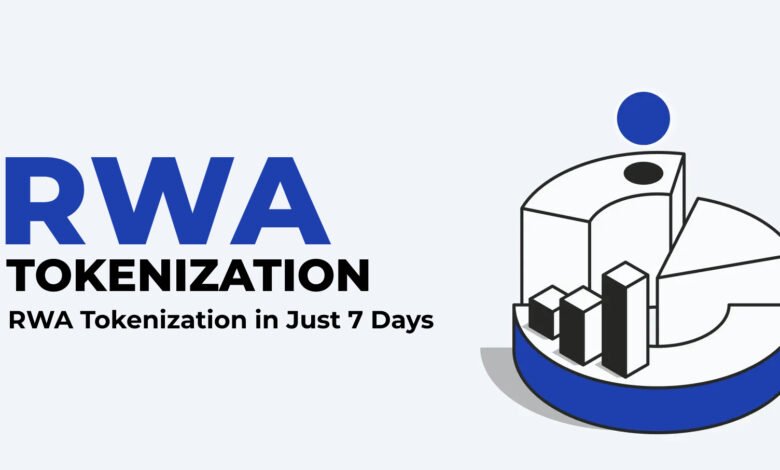
The real estate market has long been a cornerstone of wealth generation and investment. However, traditional real estate transactions often come with significant barriers, including high costs, lack of liquidity, and complex legal processes. In recent years, the advent of Real-World Asset (RWA) tokenization has emerged as a revolutionary solution to these challenges, leveraging blockchain technology to create a more efficient, transparent, and accessible market. In this blog, we will explore how RWA tokenization is transforming the real estate landscape and what this means for investors, developers, and the broader economy.
What is RWA Tokenization?
RWA tokenization refers to the process of converting physical assets, such as real estate properties, into digital tokens on a blockchain. Each token represents a fractional ownership of the asset, allowing multiple investors to own a share of the property. This process enhances liquidity, democratizes access to investments, and simplifies transactions.
1. Increased Liquidity
One of the most significant advantages of RWA tokenization is the increased liquidity it offers. Traditionally, completing real estate transactions can take anywhere from weeks to even months. The tokenization process enables quicker buying and selling of property shares, as these digital tokens can be traded on blockchain marketplaces. This means that investors no longer need to wait for a buyer to emerge; they can sell their tokens at any time, just like trading stocks or cryptocurrencies.
For instance, if an investor holds a token representing a share in a commercial property, they can sell that token on a marketplace, allowing them to cash out their investment without the lengthy process associated with traditional real estate sales. This enhanced liquidity attracts a broader range of investors, including those who may have previously been hesitant to enter the real estate market due to the long-term commitment typically required.
2. Lower Barriers to Entry
RWA tokenization lowers the barriers to entry for real estate investment. Traditionally, purchasing a property requires significant capital, often placing it out of reach for average investors. Tokenization allows individuals to invest in real estate with smaller amounts of money, as they can buy fractions of a property rather than the entire asset.
For example, instead of needing hundreds of thousands of dollars to purchase a rental property outright, an investor can buy a fraction of that property through tokens, sometimes for as little as a few hundred dollars. This democratization of real estate investment opens the door for more people to participate in the market, increasing overall investment and diversity.
3. Enhanced Transparency and Security
Blockchain technology, which underpins RWA tokenization, offers unparalleled transparency and security. Every transaction involving the tokens is recorded on the blockchain, providing an immutable ledger that can be accessed by all stakeholders. This transparency helps to build trust among investors, as they can verify ownership and transaction history without relying on third parties.
Additionally, the use of smart contracts—self-executing contracts with the terms of the agreement directly written into code—ensures that transactions are automated and secure. This minimizes the risk of fraud and disputes, as the terms of ownership transfer and profit distribution are clearly defined and enforced by the blockchain.
4. Fractional Ownership and Diversification
RWA tokenization allows for fractional ownership of real estate, enabling investors to diversify their portfolios easily. Instead of putting all their capital into a single property, investors can spread their investments across multiple tokenized assets. This diversification reduces risk and enhances potential returns, as investors can take advantage of various market opportunities.
For instance, an investor might choose to buy tokens in a residential property, a commercial building, and a vacation rental. This strategy not only mitigates risk but also allows investors to benefit from different income streams and market conditions.
5. Streamlined Transactions and Reduced Costs
Traditional real estate transactions are often cumbersome and costly, involving multiple intermediaries such as agents, lawyers, and banks. RWA tokenization streamlines this process by reducing the number of intermediaries required. Smart contracts automate many of the legal processes, significantly cutting down transaction costs and time.
Moreover, the ability to trade tokens on blockchain platforms eliminates the need for extensive paperwork and manual processes. This efficiency not only benefits individual investors but also enables developers to raise funds more quickly for new projects through token sales.
6. Access to Global Markets
Tokenization makes the real estate market accessible to a worldwide audience. Investors from anywhere in the world can participate in real estate investments without the need for physical presence or local knowledge. This access enhances market liquidity and creates opportunities for developers to attract capital from a broader range of sources.
For example, a developer in New York can raise funds for a project by selling tokens to investors in Asia or Europe, significantly widening their potential investor base. This globalization of real estate investment fosters competition and innovation in the market.
7. Regulatory Compliance and Innovation
As RWA tokenization gains traction, regulatory frameworks are evolving to accommodate this innovative approach. Governments and regulatory bodies are increasingly recognizing the potential of tokenization to enhance transparency and security in real estate transactions. As regulations become clearer and more supportive, the market for tokenized assets is likely to expand further.
Companies like Blockchain App Factory are at the forefront of developing compliant tokenization solutions, helping to bridge the gap between traditional real estate practices and the innovative potential of blockchain technology. By ensuring compliance with local laws and regulations, these companies contribute to the legitimacy and stability of the tokenized real estate market.
Conclusion
RWA tokenization is revolutionizing the real estate market by increasing liquidity, lowering barriers to entry, enhancing transparency, and streamlining transactions. As this innovative approach continues to gain traction, it offers unprecedented opportunities for both investors and developers. By democratizing access to real estate investment and creating a more efficient marketplace, RWA tokenization is poised to reshape the future of real estate as we know it.
With companies like Blockchain App Factory leading the charge, the integration of blockchain technology into the real estate sector is not just a trend; it’s a fundamental shift that promises to make real estate investment more accessible, secure, and efficient for everyone involved. As we move forward, the potential for growth and innovation in this space is limitless, paving the way for a new era in real estate investment.



